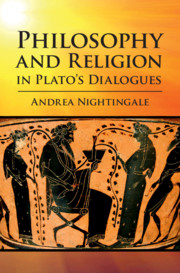Book contents
- Philosophy and Religion in Plato’s Dialogues
- Philosophy and Religion in Plato’s Dialogues
- Copyright page
- Dedication
- Contents
- Figures
- Acknowledgements
- Introduction
- Chapter 1 The Forms, the Good, and the Divine
- Chapter 2 Eternal Longings
- Chapter 3 Dialogue of Self and Soul
- Chapter 4 Wings of Desire
- Chapter 5 The Gods Made Visible
- Conclusion
- Bibliography
- Index
Conclusion
Published online by Cambridge University Press: 15 April 2021
- Philosophy and Religion in Plato’s Dialogues
- Philosophy and Religion in Plato’s Dialogues
- Copyright page
- Dedication
- Contents
- Figures
- Acknowledgements
- Introduction
- Chapter 1 The Forms, the Good, and the Divine
- Chapter 2 Eternal Longings
- Chapter 3 Dialogue of Self and Soul
- Chapter 4 Wings of Desire
- Chapter 5 The Gods Made Visible
- Conclusion
- Bibliography
- Index
Summary
In his description of the sanctuary for Demeter at Mount Pron (2.35–49), Pausanias details a strange sacrificial ritual of the people of Hermionê. In the procession to the temple, men brought sacrificial cows to the open doors of the temple and then released them so that they could rush inside. When the cows had entered the temple, the people outside rapidly shut the doors of the temple. Then four old women inside the temple killed each cow in order. As Pausanias states: “A few statues of the women who have served Demeter as priestesses stand at the temple; when you go inside, you see seats where the old women wait for the cows to be driven in one by one, and also images, not all that old, of Athena and Demeter. But that which they worship more than everything else, I myself did not see (ἐγὼ μὲν οὐκ εἶδον), nor has any other man, be it a stranger or a person from Hermionê. Only the old women know what sort of thing this is (μόναι δὲ ὁποῖόν τί ἐστιν αἱ γρᾶες ἴστωσαν).” As an outsider, Pausanias could not see or know what the women experienced. As readers of Plato, we are in a similar position as Pausanias: we stand outside the door (as it were) of his theological thinking. Like Pausanias, we can see the philosopher’s upward “procession” to the realm of the Forms, and we can understand Plato’s accounts of the activities and disciplines that the philosopher engages in. We can also view, following Plato’s imagistic accounts, the philosophic soul contemplating the Forms. But we ultimately bump into closed doors. We cannot understand the philosopher’s sacred way of seeing and knowing unless we contemplate the Forms ourselves.
- Type
- Chapter
- Information
- Philosophy and Religion in Plato's Dialogues , pp. 262 - 265Publisher: Cambridge University PressPrint publication year: 2021



